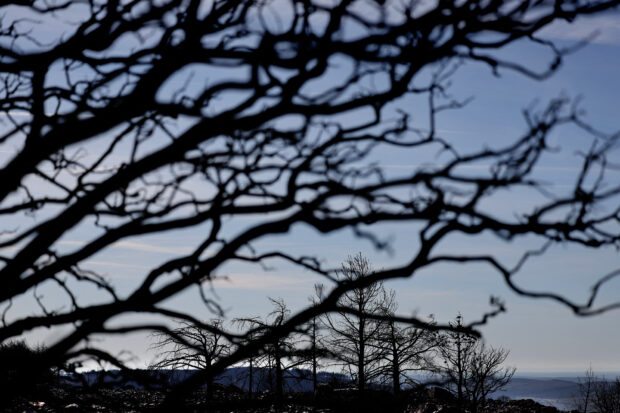
Burnt pine trees are pictured months after the area was ravaged by a huge wildfire in Sierra de la Culebra, in Sesnandez de Tabara, Zamora province, on April 7, 2023. AFP FILE PHOTO
MADRID — Spanish authorities said Saturday that firefighters and soldiers were managing to contain a blaze in the country’s west that has forced hundreds of people to evacuate from nearby villages.
“Today, we’re hoping to strike a blow against this fire… It’s a very intense task,” said civil protection coordinator Nieves Villar, adding that conditions had improved as the high wind-speeds of recent days dropped back.
That prompted regional forest fire prevention and extinction services to declare the situation “stabilised” by late evening.
“The situation with the forest fire in Pinofranqueado is better than yesterday and the change in the weather conditions can help as the hours go by,” regional government leader Guillermo Fernandez Vara said in a post to social media.
Winds are only expected to finally calm on Sunday, when there is the possibility of light rain.
Local authorities have blamed arson for the wildfire that broke out Wednesday near the village of Pinofranqueado in the sparsely populated region of Extremadura bordering Portugal.
The flames have ravaged some 3,500 hectares (8,500 acres) of forest and scrubland and forced the evacuation of around 700 people from several villages, the regional government said.
Data from Europe’s Copernicus satellite system showed as much as 12,000 hectares had been affected by the blaze across the affected province of Caceras.
Villar said 600 firefighters had been deployed overall, including Portuguese colleagues. Backing them are 14 water-bombing aircraft, the regional agriculture ministry said.
Heatwave and drought
Fernandez Vara lashed out Friday against the “bastards” who had set the fires that caused “irreversible damages that take decades to recover, if they ever recover”.
The strong winds of up to 60 kilometers (35 miles) an hour had made controlling the flames “extremely difficult”, he added.
But he expressed hope Saturday evening that more clement weather conditions in the hours ahead would make it easier to douse the fire.
Prime Minister Pedro Sanchez cancelled his participation on Friday at a rally in Extremadura ahead of regional elections on May 28 because of the blaze.
Spain, which is experiencing long-term drought after three years of below-average rainfall, has already experienced multiple wildfires this year.
The drought was made worse by an unusually early heatwave at the end of April that brought exceptionally high temperatures normally seen only in summer.
Temperatures hit 38.8 degrees Celsius (101.8 degrees Fahrenheit) in the southern city of Granada on April 27, the highest ever recorded in mainland Spain during that month.
In 2022, a particularly bad year for wildfires in Europe, Spain was the continent’s worst-hit country.
Nearly 500 blazes destroyed more than 300,000 hectares, according to the European Forest Fire Information System.
Scientists say human-induced climate change is making extreme weather events including heatwaves and droughts more frequent and more intense. They increase the risk of fires, which emit climate heating greenhouse gases.
RELATED STORIES